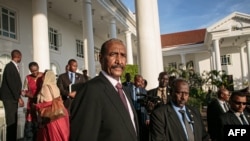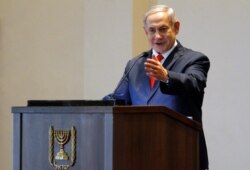The head of Sudan’s ruling body, the Sovereign Council, met with Israeli Prime Minister Benjamin Netanyahu in Uganda Monday to discuss normalizing relations between the countries. The meeting sparked criticism from religious leaders and some officials in Sudan, for whom Israel remains a sensitive issue.
Abdel Fattah al-Burhan's meeting in Entebbe with Netanyahu immediately set off controversy back in Sudan, where public and government support for the Palestinians runs strong.
Hundreds of protesters gathered in Khartoum Tuesday, condemning the meeting and the idea of normalization of ties.
Abdullahi Yousif, an influential religious man and politician, described the meeting as a betrayal for Allah, adding that Burhan is not allowed to meet with Netanyahu without authorization from other officials.
Government spokesman Faisal Salih said in a statement he had no information about the meeting and that the Cabinet had not discussed it. He said officials would wait for “clarifications” upon Burhan’s return.
Under former ruler Omar al-Bashir, Sudan built strong ties with Israel's enemy Iran, leading Israel to consider Sudan a threat.
The New York Times reported that Israeli airstrikes in 2009 and 2012 struck a weapons factory, south of Khartoum that was said to be working for the Palestinian militant group Hamas.
Bashir’s government blamed Israel for the airstrikes and said it downed an Israeli drone in 2015.
Sudanese political analyst Ahmed Abdelghani says Netanyahu's visit is part of a broad Israeli strategy.
He said normalizing relations between Sudan and Israel is an expansive step from Israel toward African and Muslims countries, as Sudan is considered a gate to other African countries. He also said this step is directly linked with Iran's expanded ties in Arab and African regions. He added that made Israel build relations with a number of countries, especially in the Red Sea region, to secure it.
Netanyahu has talked about Israel expanding relations with the Arab and Islamic worlds. In October 2018, he went to Oman on a surprise visit and renewed ties with Chad in January 2019.
Sudanese political analyst Alfatih Mahmoud says Netanyahu is trying to promote the recently-unveiled U.S. peace plan for the Middle East, while Burhan is trying to advance his own agenda.
“Netanyahu is promoting the ‘Deal of the Century’ in Africa generally and the Muslim community specifically. He is also looking for a permit to pass by Sudanese airspace and to make credits inside Israel, while Burhan is pursuing international financial support and [the] lifting [of] Sudan from United States' state sponsors of terrorism list,” Mahmoud said.
Senior Palestinian official Saeb Erekat called Burhan’s meeting with Netanyahu “a stab in the back of the Palestinian people," according to a statement published by the official WAFA news agency.





